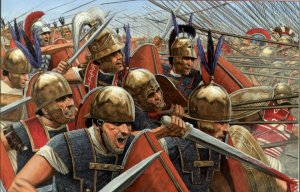
“Quocumque circumtuli oculos, plena omnia video animorum ac roboris, veteranum peditem, generosissimarum gentium equites frenatos infrenatosque, vos socios fidelissimos fortissimosque, vos, Carthaginienses, cum pro patria, tum ob iram iustissimam pugnaturos. inferimus bellum infestisque signis descendimus in Italiam, tanto audacius fortiusque pugnaturi quam hostis, quanto maior spes, maior est animus inferentis vim quam arcentis. accendit praeterea et stimulat animos dolor, iniuria, indignitas. ad supplicium depoposcerunt me ducem primum, deinde vos omnes qui Saguntum oppugnassetis; deditos ultimis cruciatibus adfecturi fuerunt. crudelissima ac superbissima gens sua omnia suique arbitrii facit; cum quibus bellum, cum quibus pacem habeamus, se modum imponere aequum censet. circumscribit includitque nos terminis montium fluminumque, quos non excedamus, neque eos, quos statuit, terminos obseruat: ‘ne transieris Hiberum; ne quid rei tibi sit cum Saguntinis!’ at liberum est Saguntum. ‘nusquam te vestigio moveris.’ parum est quod veterrimas provincias meas, Siciliam ac Sardiniam, ademisti? adimis etiam Hispanias et, inde si decessero, in Africam transcendes. transcendes dico? duos consules huius anni, unum in Africam, alterum in Hispaniam miserunt. nihil usquam nobis relictum est nisi quod armis vindicarimus. illis timidis et ignavis esse licet, qui respectum habent, quos sua terra, suus ager per tuta ac pacata itinera fugientes accipient: vobis necesse est fortibus viris esse et, omnibus inter victoriam mortemue certa desperatione abruptis, aut vincere aut, si fortuna dubitabit, in proelio potius quam in fuga mortem oppetere. si hoc bene fixum omnibus, si destinatum animo est, iterum dicam, vicistis; nullum contemptu mortis telum ad vincendum homini ab dis immortalibus acrius datum est.”
(Livy 21.44)
“Wherever I turn my eyes I see nothing but eagerness and strength, a veteran infantry, cavalry from the noblest tribes, riding with bridles or without, here the trustiest and most valiant of allies, there Carthaginians, prepared to fight not only in defence of their native land, but in satisfaction of a most righteous indignation. We are the assailants, and are descending with hostile standards into Italy, where we shall fight with more boldness and courage than our foes in proportion as our hopes are higher and the gallantry of the assailant greater than his who but defends himself. Moreover, our hearts are kindled and pricked by rancour, wrongs, and insults. They called for the punishment of myself first, as your leader, then of all of you who had borne a part in the assault upon Saguntum; had we been given up, they meant to have inflicted upon us the worst of tortures. Most inhuman and most arrogant of nations, they reckon the world as theirs and subject to their pleasure. With whom we are to be at war, with whom at peace, they think it right that they should determine. They circumscribe and hem us in with boundaries of mountains and rivers which we may not cross; yet they do not observe those boundaries which they have set. ‘Do not cross the Ebro! Have naught to do with the Saguntines!’ But Saguntum is free. ‘Do not budge from where you are in any direction!’ Is it not enough that you have taken away my ancient provinces of Sicily and Sardinia? Are you taking away Spain as well? If I withdraw from these, shall you cross over into Africa? Shall, do I say? They have dispatched the two consuls of this year, the one into Africa, and the other into Spain! Nothing is left us anywhere, except what we shall defend by force of arms. They can afford to be timid and unenterprising who have something to fall back upon; whom their own country and their own fields will receive as they flee over safe and peaceful roads. As for you, you must be stout-hearted men, and discarding, without vain regrets, all hopes of anything but victory or death, either conquer or, if Fortune falters, sooner perish in battle than in flight. If this idea has been firmly fixed and implanted in your hearts, let me say once more: the victory is already yours. The immortal gods have bestowed on man no sharper weapon for winning victories than contempt of death.” (tr. Benjamin Oliver Foster)






